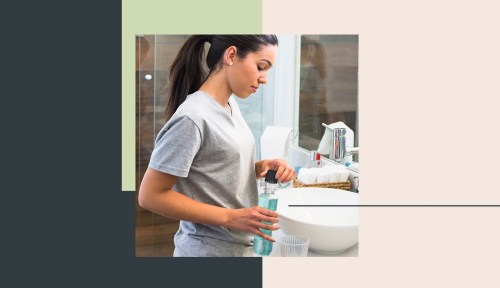Even the Author of That Viral Study Says Mouthwash Does *Not* Protect You From COVID-19
Even the author of that viral mouthwash study says everyone is reading it wrong. Here's what it really says about COVID-19 and your health.

Reports that mouthwash has the power protect you from the coronavirus are overblown, say scientists. Skepticism began to arise when the cast of Riverdaleused mouthwash between kissing scenes in an attempt to prevent the spread of the virus. And then headlines began to spring up claiming that a new study proves mouthwash inactivates the virus that causes COVID-19. But that’s not the full story.
Experts in This Article
epidemiology professor and founding director of the epidemiology program at the University of Delaware
Jennifer Horney, PhD, MPH, an epidemiology professor and founding director of the epidemiology program at the University of Delaware, says that mouthwash cannot protect you from the coronavirus. And the study results never proved that it could.
“Like many studies, the findings have been widely and rather dramatically over-interpreted in the media. This study didn’t involve human subjects but rather applied the mouthwash to cells grown in a lab,” says Dr. Horney.
The study in question was published in mid-September by the Journal of Medical Virology. Researchers at Pennsylvania State University examined how nasal rinses and mouthwashes impact the presence of human coronaviruses in the body. They infected human cells with a human coronavirus similar to SARS-COV-2 and exposed them to varying types and concentrations of nasal rinses and mouthwashes. They found that exposing the cells to mouthwashes like Listerine was effective in decreasing the amount of virus present. Dr. Horney explains that because this study was performed on cells in a laboratory dish, its results don’t exactly translate to what happens in humans.
“While mouthwashes may provide some immediate extra layer of protection—say to dental staff who might ask patients to rinse with it just before procedures—by reducing the amount of virus in the mouth, infected cells are constantly making more virus, so this doesn’t have much impact on an infected person’s ability to transmit the virus to others,” says Dr. Horney.
Even the microbiologist who authored the study, Craig Meyers, PhD, says its results cannot be applied to what happens in humans. “Clinical trials are needed to determine if these products can reduce the amount of virus COVID-positive patients or those with high-risk occupations may spread while talking, coughing, or sneezing,” he said in a press release. In an interview with The New York Times,he further explained that these results don’t claim that mouthwash alone can be used to limit the spread of human coronaviruses. “All we’re saying right now is, this could add an extra layer of protection,” he says.
Dr. Horney reminds us that there are still a lot of unknowns surrounding this virus, and that what happens in studies doesn’t always apply to real life.
“The study reminds me a lot of the early studies that showed how long the coronavirus could live on cardboard and other items in a laboratory setting,” says Dr. Horney. “This led to a lot of concern about the ability of groceries or mail to transmit COVID. But in real-world conditions, the virus doesn’t seem to be well transmitted via fomites—objects or materials that might be contaminated with virus.”
However, scientists do know that practices like social distancing and mask-wearing are the best modes of protection that we have so far. “As we enter flu season, keep up that vigilance with handwashing and cleaning high-touch surfaces,” says Dr. Horney.
Sign Up for Our Daily Newsletter
Get all the latest in wellness, trends, food, fitness, beauty, and more delivered right to your inbox.
Got it, you've been added to our email list.










